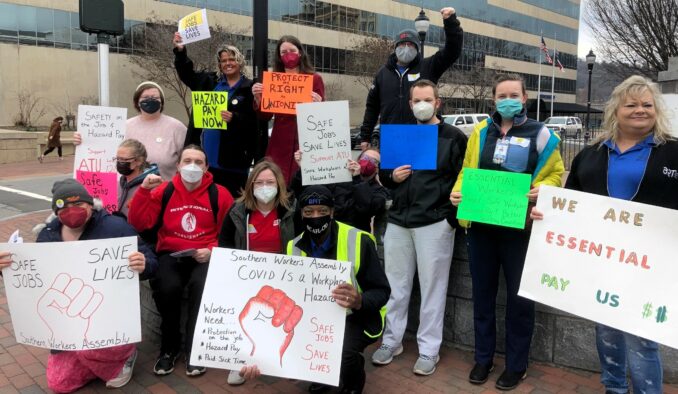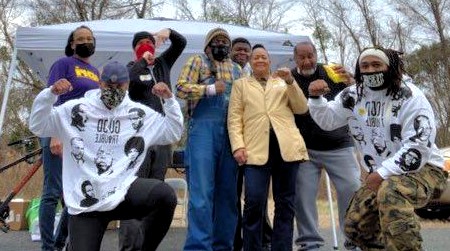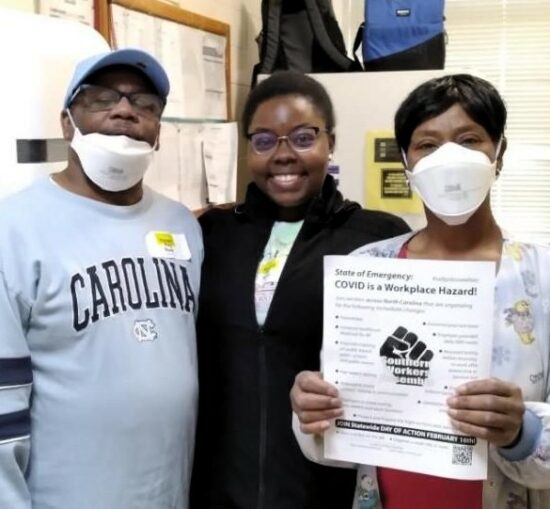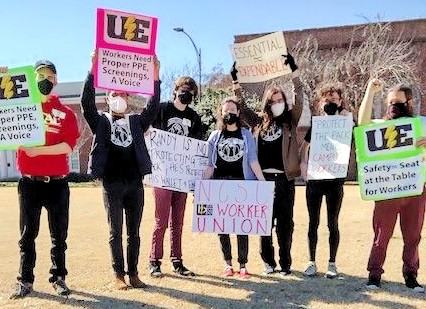North Carolina workers organize emergency rallies for safety
This lightly edited article was published as a Feb. 16 report at southernworker.org, Statements are testimony given to the writer by participants in the Southern Workers Assembly Day of Action.Durham, North Carolina
Gloria Lee, a former Amazon worker, spent her Feb. 16 afternoon leading chants and talking to Amazon workers outside a delivery station in East Durham. “Jeff Bezos you can’t hide! We can see your greedy side,” she chanted along with other Amazon workers and supporters as part of a statewide day of action around COVID-19 workplace safety issues. Lee cited the recent death of an Amazon worker at the fulfillment center in Garner as one reason she felt compelled to organize the action.
On Feb. 16, thousands of workers in dozens of workplaces across the state participated in workplace actions to demand more safety amid COVID-19. Delta and omicron variants are continuing to surge across North Carolina and increasingly pose a terrifying workplace safety concern. Besides the Amazon worker at the Garner RDU1, a Charlotte City light-rail operator has died of COVID-19.
Employers and the North Carolina Department of Labor are not moving to implement emergency standards to keep workers safe. Labor leaders have been meeting with NCDOL Commissioner Josh Dobson. Yet, despite his public pronouncements, Dobson has done little to keep workers safe, failing to increase enforcement and implementation of Emergency Temporary Standards (ETS) to address the unique challenges of the coronavirus.
“Amazon doesn’t care about the protocols to keep us safe; they only care about their profits,” stated Kaiya Taylor, associate at Amazon RDU5 Sort Center in Durham and member of the Carolina Amazonians United for Solidarity & Empowerment (CAUSE).
Taylor continued, “Like making sure everyone is wearing masks correctly and social distancing. It’s clear that is not important, even to management, when they fail to set an example in following those protocols. If I get sick, I am most worried about getting my parents sick, who are in the age group that is most at risk.”
Members of the Southern Workers Assembly took action behind a unified set of demands. Those participating included Amazon workers; meat-packers; mental health workers; nurses; bus drivers; education workers; sanitation, water department and other workers in every corner of the state. Thousands of workers wore stickers to work that said: “Hazard Pay Now!” and “Safe Jobs Save Lives.” Others rallied in front of their workplaces.

Amalgamated Transit Union Local 128 members, Asheville, N.C. Western NC Workers Assembly. Credit: Western NC Workers Assembly
Workers organizing, from Asheville in the west . . .
At Mission Hospital in Asheville, nurses participated in a lunchtime press conference, demanding Dobson extend the ETS and do timely, thorough investigations into safety complaints, as well as set safe-staffing ratios. The hospital was bought out by a national chain, Healthcare Corporation of America, a few years ago, which galvanized nurses to organize into the National Nurses United union.
“At Mission Hospital far too many colleagues of mine have been out sick with COVID-19,” stated Claire Siegel, Registered Nurse. “HCA’s failure to comply with state health and safety laws, the locking up and hiding of personal protective equipment (PPE) and their unsafe staffing have all contributed to a work environment where catching COVID-19 is a constant concern for the nurses. I’m proud to be active in my union advocating for safer standards at Mission Hospital and across the state.”
The union filed a series of complaints with the state Occupational Safety and Health Administration resulting in an investigation but no decision so far. There have been various violations of the ETS, including forced reuse of PPE.
Down the street from the hospital, Albert Maybin, president of the Amalgamated Transit Union Local 128 representing city bus drivers, led a rally in Pack Square, supported by the Western N.C. Workers Assembly. “Local management in Asheville is continuing to spend money keeping the public and the bus drivers supplied with masks that are the least effective in protecting against COVID-19,” said Maybin. He continued, “They spent $0.00 for N-95 masks, which are proven to be most effective. And, YES, we do deserve hazard pay!!”
. . . to Fayetteville in the east . . .

Valley Protein workers, Fayetteville, N.C.Credit: Chris Hollis
On the other side of the state, in Fayetteville, out in front of Valley Proteins meat-rendering facility, workers set up a union outreach tent and distributed flyers to workers entering the plant. Workers have been building the Valley Protein Blue Collar Workers Organizing Committee, an affiliate of United Electrical Workers Local 150, for almost two years.
Most recently, workers rallied after the tragic death of two of their co-workers in a meat pit, after being exposed to high levels of hydrogen sulfide gas. Union members have documented that no PPE or oxygen monitors were present at the time of the accident. NCDOL is still in an ongoing investigation, nearly four months after the deaths.
“The COVID-19 situation was not taken seriously at all by Valley Protein; it was swept under the rug until three of the management caught COVID-19,” revealed Raw Driver, a member of UE Local 150 organizing committee at Valley Proteins Inc. “They put plexiglass up in the office, where you talk to management. They were able to go home and get paid time off. When the plant workers and drivers tested positive, they couldn’t go home. If they stayed home, they weren’t paid and got written up.”
. . . into the heart of the state . . .
Workers at state mental health facilities of the N.C. Department of Health and Human Services — including Central Regional Hospital in Butner, Caswell Center in Kinston, Longleaf Center in Wilson, and O’Berry Center and Cherry Hospital in Goldsboro — participated in the action by wearing stickers on the job and hosting small lunchtime rallies.
These workers belong to the N.C. Public Service Workers Union, UE Local 150, which has been in an ongoing campaign for “safe staffing.” That was a response to 2,300 out of the state’s 11,000 direct care positions being vacant. Many units have had to close down. Workers at Central Regional Hospital report that they are now serving only 295 patients, down from the pre-pandemic level of 380 patients. Many local hospitals don’t even try to admit patients there anymore, since they are often left languishing for long hours in Emergency Rooms without proper care.

Mental health workers, Caswell Center, Kinston, N.C.Credit: UE150
“COVID-19 has been very hard on us at CRN. We have lost a ton of staff because it’s too stressful,” lamented Debra Hartman, RN. Hartman continued, “Now we get mandated to work on our days off, especially weekends, due to short staffing. We need safe staffing and hazard pay to retain staff.”
“Management doesn’t want us to know information to be safe. They are not telling us anything. They don’t even want to give us hazard pay. So many workers are quitting, and we are changing to 12-hour shifts just to cover the evening shift,” disclosed Phyllis Jones, who is a youth program education assistant at Murdoch Developmental Center, and steward of UE150 in Butner.
“My issue with COVID-19 is that many health care workers are having to work long hours and in areas they know nothing about. Workers are sick and tired of doing this day in and day out for over two years and not getting compensated. This is why we need hazard pay now!” demanded William Young, a cook at Cherry Hospital, where he serves as president of the UE Local 150 Goldsboro chapter.
. . . including the state’s capital and biggest cities
In the capital city of Raleigh, graduate workers at N.C. State University rallied in front of Chancellor Randy Woodson’s office demanding resumption of online classes, as well as other safety measures.

Student workers, North Carolina State University, Raleigh. Credit: UE150
“I’m happy that the University offers free PCR tests to us whenever we want them, but it doesn’t justify the university administrators seeing a wave of a hypercontagious, vaccine-resistant COVID-19 variant spread across the country and still forcing people to teach and go to class in person,” emphasized Alex Wall, a lab technician in Biological Sciences. Wall, a leader in the UE 150 organizing committee, continued, “It’s so frustrating that after nearly two years of this, the administrators’ response is to tell us to ‘grin and bear it,’ while they work from home and don’t actually risk exposure to come to work.”
UE Local 150 members who are municipal workers in the City of Charlotte and manufacturing workers at Cummins Diesel Engine Plant in Rocky Mount participated heavily in the sticker day action.
Members of the National Domestic Workers Alliance-We Dream in Black wore stickers in Charlotte and Durham. Shara Clark, NDWA-WDB member in Charlotte commented: “In health care, it is the responsibility of the facility or health care worker to ensure safety for themselves and their client or patient. Proper PPE helps to cut down on the risk of cross contamination, COVID-19 and other bacterial infections.”
Members of NC Raise Up–Fight for $15 joined in the day’s events. “Management basically avoided addressing the risk of night shift being exposed to COVID-19,” revealed Nina Bailey, Bojangles worker and member of Fight for $15 & a Union, in Burnsville. “Our safety is one of the reasons we are striking.”
In Durham, William Simpson, a housekeeper and member of Fight for $15 & a Union, pointed out: “Our lives are the ones that are on the line. We regularly have to go into those contact rooms. Our employers refuse to give us hazard pay or take our well-being into consideration.”
Kenton Gerald, a Durham worker at Biscuitville and member of Raise Up/Fight for $15 & a Union, added: “It’s hard to survive on these low wages without hazard pay or even proper PPE to keep safe.”
The workers are uniting in these demands: “That our bosses and the government grant the following: hazard pay: universal paid sick leave; universal health care and Medicare for all; employer-provided daily N95 masks; required masking on public transit, public schools and public events; required testing before returning to work after quarantine or positive test; free weekly testing; employers to enforce social distancing; enforced and timely contact tracing and communication; sanitation of workstations and work vehicles; employers to share testing rate and work locations weekly.”
These North Carolina workers say: “Protect and expand the right to form and join a union!”

